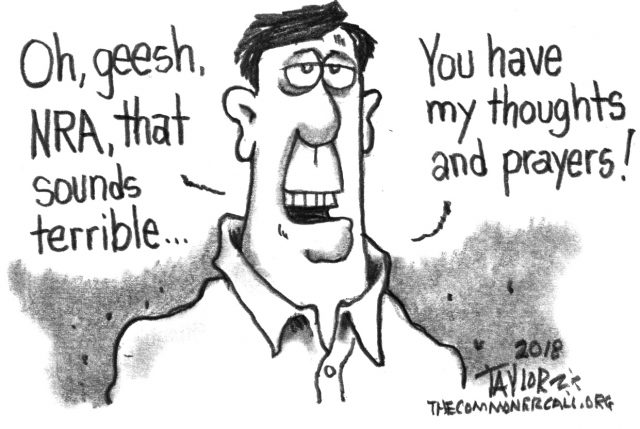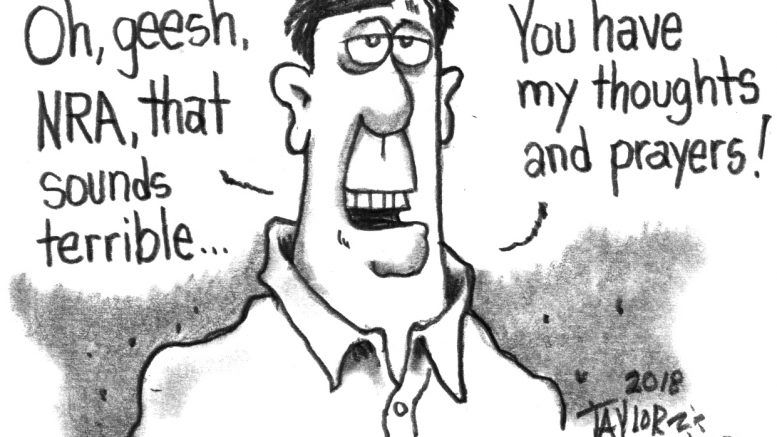
By Alex Yablon
The Trace (8/1/18)
The National Rifle Association typically portrays itself as an indomitable force. But an ongoing court case has the gun group taking inventory of its wounds. In a new legal filing, it contends that New York Governor Andrew Cuomo’s campaign to pressure insurers and financial services companies to cut ties with the NRA could deeply harm its financial health and ability to “fulfill its advocacy objectives.”
In the complaint, entered July 20 and first reported by the New York Law Journal, the NRA claims it has lost income and access to banking services as a result of the state’s actions. One of the more dramatic impacts of Cuomo’s push: The NRA says it has not been able to renew its media liability insurance. If the group cannot secure a policy soon, it could be forced to shutter its multimillion-dollar television network, NRATV, or a number of its print publications, the complaint reads. The NRA also says that, without insurance, it “cannot maintain its physical premises” or “convene off-site meetings and events.”
“Defendants’ concerted efforts to stifle the NRA’s freedom of speech and to retaliate against the NRA based on its viewpoints are causing other insurance, banking, and financial institutions doing business with the NRA … to rethink their mutually beneficial business relationships with the NRA for fear of monetary sanctions or expensive public investigations,” the complaint reads.
The NRA’s original lawsuit against Cuomo and the New York Department of Financial Services was filed in response to an April directive issued by the governor to the state agency to urge insurers and financial firms to consider whether any relationships those companies may have with the NRA constitute reputational risks. Cuomo’s order came in the midst of a wave of activism following the school shooting in Parkland, Florida, aimed at big banks and insurers that provided NRA members with discounts or special offers.
According to tax filings, the NRA’s core organization ended 2016 in debt to the tune of $43 million, owing an additional $40 million in pension liabilities. Instead of Carry Guard digging the NRA out of that hole, the backlash may have dug them in even deeper.
At Cuomo’s behest, the state also levied more than $8 million in fines against Chubb and Lockton Affinity, insurance companies supporting the NRA’s “Carry Guard” self-defense program in New York State. Carry Guard was marketed to NRA members as a firearms-training program that also provided insurance to cover legal fees and liabilities arising from self-defense shootings. The action led both companies to announce they were entering into consent agreements with the state and would no longer do business with the NRA.
In the original lawsuit filed in May, the NRA characterized the action by Cuomo and the agency as “discrimination against the NRA and the millions of law-abiding gun owners it represents,” solely to “deprive the NRA and its constituents of their First Amendment rights to speak freely about gun-related issues and defend the Second Amendment.”
Carry Guard
As The Trace has reported, Chubb and Lockton’s departure from the Carry Guard program represented a significant financial blow to the NRA. The NRA heavily promoted Carry Guard when the program debuted in the Spring 2017. When the gun group held its annual meeting in Atlanta that year, it flew three-story-tall banners advertising Carry Guard from the side of the city’s convention center. According to a consent agreement signed by Lockton, the NRA earned just over $21,000 in royalties from Carry Guard subscriptions in New York alone, and made $1.9 million from sales of that and other insurance products in the state from 2000 to 2018.
One former employee of Ackerman McQueen, an advertising and public relations agency known to shape the NRA’s strategy and certain programs, said the group was counting on Carry Guard to provide revenue after Donald Trump’s 2016 election win. With Trump in the White House and Republicans leading Congress, the NRA could not plausibly motivate its membership to reach for their wallets by raising the specter of federal gun control. Without that fear factor driving donations, the group has needed alternate sources of cash.

